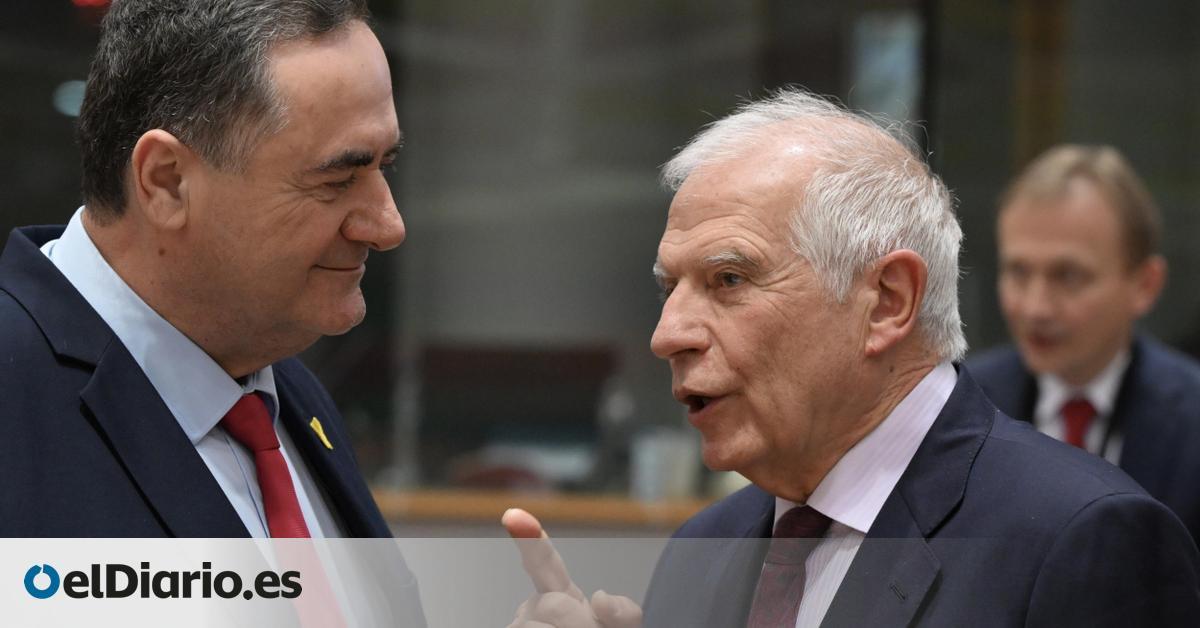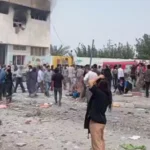
An “exceptional” date. This is how the high representative, Josep Borrell, defined the meeting of EU foreign ministers this Monday. Not so much because of the conclusions that could come out of it but because of the guests at the table: his counterparts from Israel, the Palestinian Authority, Saudi Arabia, Egypt and Jordan, as well as the secretary general of the Arab League. And in this context, the head of European diplomacy has presented a 12-point peace plan that aims to pacify relations between Israel and Palestine and that fundamentally involves the two-state solution that he vehemently rejects. the Government of Benjamin Netanyahu. Although the EU has increased pressure on Tel Aviv, after more than three months of war with more than 25,000 dead, the position is insufficient for the Palestinian National Authority, which calls on the 27 to demand a ceasefire to which there is no consensus.
“We have to discuss with them [Israel] What solutions do you have in mind? Which are? Let all the Palestinians leave? Kill them?” Borrell said before entering the meetings. A few days earlier, in a university speech, the head of European diplomacy accused Israel of having created Hamas and opted for the two-state solution to be “imposed from outside” given his refusal to accept it.
“A long process”
“An essential element of the Peace Plan should be the development of solid security guarantees for Israel and the future independent State of Palestine, conditional on full mutual diplomatic recognition and the integration of both Israel and Palestine in the region,” the proposal states. of 12 points prepared by the department headed by Borrell. “Now we are no longer talking about peace but about peace through a concrete procedure,” he said in a press conference after the meeting. However, he has acknowledged that “the process will be long.” “All initiatives are welcome and we have to put order in the traffic to achieve something operational that obtains enough support so that it can fly,” said Borrell, who is aware that the United States has to be immersed in any process.
One after another, foreign ministers have endorsed the two-state solution as the “only viable one.” “Netanyahu’s position is worrying, a two-state solution will be necessary,” said the new French minister, Stéphane Séjourné. “It is not acceptable,” said the Finn, Elina Valtonen, about that refusal. “It is time to move from talking about the two-state solution to the implementation of the two-state solution,” added the Spaniard, José Manuel Albares, who has parked recognition by Spain at least until the peace conference. .
The Latvian, Krisjanis Karins, opted to pressure Israel economically: “Europe’s greatest capacity for influence has always been its portfolio. We see that in European policies, money can help focus minds and I think we also have to start thinking about it internationally.”
Even Germany, traditionally aligned with Israel, has raised its tone. “As urgent as it is that we alleviate the acute suffering – expressed the head of diplomacy, Analenna Baerbock, regarding the lack of humanitarian aid – and that we finally release all the hostages who are alive, it is also crucial that we make it clear that Israel can only live in security if Palestinians can live in security with dignity. And Palestinians can only live with dignity, security and freedom if Israel lives in security. That is why the two-state solution is the only solution, and all those who do not want to know anything about it have not yet presented any other alternative.”
Israeli presents artificial island for Gaza
The message was delivered in person to the Israeli Foreign Minister, Israel Katz, who, however, took advantage of his intervention to show two videos about infrastructure projects for the area, such as a railway line to link the Middle East and India. and an artificial island that can be used for the entry of goods into Gaza, and which was his proposal in 2017. “The minister could have made better use of his time to worry about the security of his country and the high number of deaths in Gaza” Borrell said after the meeting.
The security of Israel and the need to “bring the hostages back” is the only thing that the minister of that country, Israel Katz, has alluded to in his statement barely one minute upon arrival at the meeting in which has not accepted questions from journalists.

Despite the increase in pressure from the EU, it is insufficient for the Palestinian National Authority, whose Foreign Minister, Riyad Al-Malki, has acknowledged that “there is clear progress” in the position with respect to the month of October, but has demanded that the 27 demand a ceasefire. “Every day that we do not reach a ceasefire we count 1,000 Palestinians killed or injured,” he lamented.
There is still no consensus within the EU to take this step, although more and more Member States are moving in this position compared to previous months. In the vote on the UN resolution, two voted against (Austria and the Czech Republic) and seven abstained, including Germany, which maintains that demanding a ceasefire could go against Israel’s right to self-defense.
The representative of the Palestinian Authority has also called on the EU to impose sanctions on the Israeli prime minister. “I hope that you will begin to consider sanctions against Netanyahu and others who are really destroying the possibilities of a two-state solution and peace in the Middle East,” he said before warning that if he did not do so, the 27 could be charged. of “double standards” regarding the war in Ukraine.
But the balance in the EU is numerous in the case of the relationship with Israel and an agreement has not yet been reached to sanction the violent settlers in the West Bank. “We continue working on sanctions against extremists. The work is underway in the technical groups, I hope it will be approved soon,” said Borrell.
Source: www.eldiario.es

